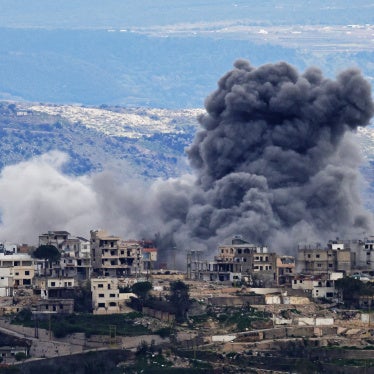The United Nations Security Council has reached a critical moment to take strong action against Sudan’s continuing atrocities in Darfur, Human Rights Watch said today.
Today’s briefing by the U.N. Secretary-General’s special representative for Sudan Jan Pronk presented a report which failed to say directly that the Sudanese government is responsible for ethnic cleansing and continuing abuses in Darfur.
“Thirty-four days ago, the U.N. Security Council told Khartoum that it had 30 days to end massive violations of human rights and rein in the Janjaweed,” said Georgette Gagnon, deputy director of the Africa Division at Human Rights Watch. “For the U.N. Security Council to fail to deliver on its own strong demands sends the worst possible message.”
In its July 30 resolution 1556 on Darfur, the Security Council signaled its intention to consider imposing sanctions under Article 41 of the U.N. Charter against the government of Sudan. The Security Council has imposed sanctions on the Janjaweed militia and imposed an arms embargo on Darfur, but has not authorized enforcement of those sanctions.
In recent weeks, Human Rights Watch has documented continuing depredations against civilians in Darfur, including the existence of at least 16 armed Janjaweed camps terrorizing civilians in plain view.
Human Rights Watch said that the United Nations should urgently reinforce international observer and troops in Darfur, impose an arms embargo against the Sudanese government, and launch and international commission of inquiry.
Though the Secretary General’s report states that the Sudanese government is failing to protect civilians and to disarm the ethnic Janjaweed militias that have perpetrated many of the attacks against civilians — key commitments made by the government — the Security Council appears unlikely to take immediate new action to protect civilian life in Darfur.
Even more startling, Human Rights Watch said that the report fails to acknowledge what several U.N. agencies and scores of independent reports have documented: that the government of Sudan is responsible for these attacks against civilians, directly and through the Janjaweed militias it supports.
“Although it appears the U.N. Security Council will not act today, there is still a chance for the United Nations to make good on its word to the people of Darfur,” said Gagnon.
Human Rights Watch called on the Security Council to urgently ask the African Union, under Chapter VII of the U.N. Charter, to increase the number of troops on the ground in Darfur and to expand its mandate to include protection of civilians. The A.U. has 305 soldiers on the ground now as part of a ceasefire monitoring mechanism. A U.N./A.U. plan, outlined to the Security Council last week, would provide for 3,000 A.U. military troops and 1,200 A.U. police on the ground in Darfur. The Sudanese government has rejected A.U. offers to increase its mandate and the size of the force to protect civilians.
Gagnon said the Security Council should establish an international Commission of Inquiry to collect evidence of the atrocities committed in Darfur. The U.N. High Commissioner for Human Rights made such a recommendation in a May 7 report and later briefing at the Security Council. The report makes no mention of such a commission.
Human Rights Watch urged the Security Council to impose sanctions on the top military and civilian leaders in the Sudanese government, including travel bans and asset freezes, and an arms embargo on Sudan as a whole, with enforcement mechanisms for all sanctions.
Since the initial 30-day deadline has expired, Human Rights Watch said the Security Council needs to say when it will meet to take further action on the Sudanese government’s performance pursuant to S.C. Resolution 1556 and what further deadlines will be imposed.







